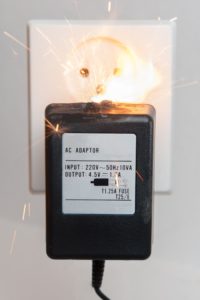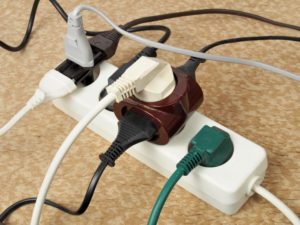Tips to Prevent and Combat Home Electrical Fires

Protect Your Home and Your Family From Electrical Fires
Nearly every home in America has a powerful and primed source of fire at this very moment, and it’s called electricity. From overloaded outlets to dated or defective wiring, there’s likely to be at least one electrical fire hazard in some corner of your home.
The United States Consumer Product Safety Commission reports that faulty electrical wiring in residential homes cause over 40,000 fires each year. Over the last decade, defective electrical wiring has caused an average of 350 deaths per year. And in 79% of home electrical fires, the fire spreads beyond the object where the fire starts.
One of our clients in Elkridge, Maryland recently had a house fire due to an electrical issue that seemed harmless. A chair was accidentally set on top of an electrical extension cord (which was plugged into the wall with nothing plugged in at the other end), which caused a short in the wire, which then cause the house fire to occur, causing his house to be a total loss. At Huff Insurance, we had the proper home insurance protection plan in place, so even though our insured suffered a tremendous loss emotionally, he was taken care of financially bu the home insurance company.
According to the National Electrical Safety Foundation, homeowners can use the following fire prevention tips to help create a fire-proof home electrical system:
- Use child-proof outlets to prevent small children from sticking an object into the outlets.
- Do periodic checks of all electrical cords, replacing any damaged or frayed ones, untangling knotted cords, and ensuring that none have been placed under carpets or rugs.

- Never overload outlets or extension cords. Although not always present, it could be a sign of an overloaded circuit if your appliances aren’t working up to par, the television has a poor picture, the HVAC isn’t performing properly, and/or the lights are dimming on their own. You might also ask an electrician to tell you what the maximum capacities are for the circuits in your home. By knowing this, you can add up the wattage of all the electrical devices plugged into each circuit and be able to ensure that the total load for each circuit is below its maximum capacity.
- Consider updating the entire electrical system with copper wiring in homes 40 or more years of age. Older homes with dated aluminum wiring, or knob and tube wiring, are more prone to electrical fires than those with more fire-resistant copper wiring.
- Use the proper wattage bulb for every light fixture and lamp in your home, ensuring that you never exceed the recommended wattage.
- Arc fault circuit interrupters (AFCI) can be installed to help protect against electrical fires caused by arc faults, which are simply electrical currents being discharged across a gap. Wire insulation that’s pinched, overheated wires, and improper electrical connections are common sources of arc faults.
- Ground fault circuit interrupters (GFCIs) can be installed in your bathrooms, utility room, and kitchen to help protect your family from the risk of electrocution. GFCIs will detect any imbalance in electricity and shut down the electrical system.
- Use a power surge protection device for your computer and other large electronics. Electrical devices plugged into a circuit that receives a power surge, or sudden rush of voltage, can be damaged beyond repair.
- Unplug electrical extension cords and re charging cords when not in use. Per our example above, these can pose potential fire hazards.
Of course, despite all precautions, you still need to know what to do should an electrical fire start.
For an electrical fire at a wall outlet, you can either turn off the main switch -or- if you can do it safely, immediately try to pull anything that’s plugged into the outlet out by pulling on the end of the cord furthest away from the outlet. CO2 fire extinguishers can be used for small electrical fires, but do remember never to use water on an electrical fire.
In the event the electrical fire is large or otherwise uncontrolled, then you should evacuate the home and immediately alert the fire department that you have an electrical fire. It’s important that you tell the fire department if you suspect the fire could be electrical since they may be able to shut off the main power source and prevent it from spreading.
Should you be unfortunate enough to suffer through an electrical fire, you should contact your insurance agent to report the claim. They should be able to review your homeowners insurance policy and talk to you about what to expect throughout the claims process.
Huff Insurance is a full service Independent Insurance Agent We have been dedicated to Protecting Lifestyles™ since 1960. We offer a full array of Personal Insurance, Commercial Insurance and Life Insurance & Health Insurance products. Call us at 410-647-111

